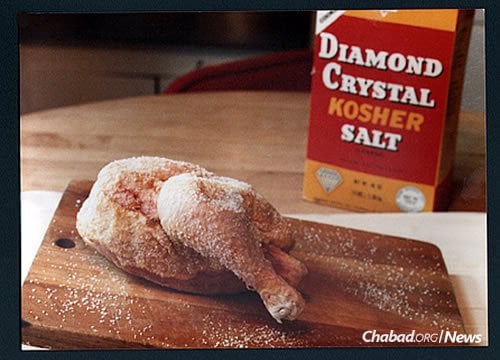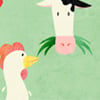Kosher Animals
The Torah commands us only to eat animals which:
have split hoofs.
chew their cud.
These include the cow, sheep, deer. It excludes the pig, horse, rabbit. Furthermore, the animal must be slaughtered in a special way, called Shechita, which is described in the Torah. Shechita is the quickest and least painful method of slaughtering an animal. A qualified Jew called a Shochet, who knows all the laws of Shechita, must slaughter the animal.
Animal Products
Any meat, fat, oil etc that comes from an animal which is not slaughtered by a Shochet is NOT kosher. Confectionery, cakes, biscuits etc. which contain animal fats are NOT kosher. Any food with animal derivatives MUST be under Rabbinical supervision.
Kosher — Treifa
After slaughtering an animal, the Shochet checks the animal for any defects. If a defect is found, the animal is declared Treifa [lit. torn, i.e. will not live because of the defect] and it is not kosher. Often defects are found on the lungs of an animal. If the lung is smooth and healthy it is called Glatt — hence the term Glatt Kosher.
It is common usage to say that anything that is not kosher is Treifa.
Birds
The Torah lists 24 species of forbidden birds. These include all birds of prey. Permitted birds include domestic fowl such as chicken, duck, goose and turkey.
Salting Meat
In addition to the fact that animals and poultry must be slaughtered by a Shochet, the Torah commands us to remove all the blood from the dead animal. This is done through salting. The meat is first washed and then soaked in water for half an hour. It is then placed on a slanting board and sprinkled all over with medium coarse salt which causes the blood to be drawn out of the meat. It is important that the salt is sprinkled on all sides paying particular attention to any folds and cuts. The meat is left on the slanting board for one hour allowing the blood to drain away. Finally it is rinsed under running water to ensure all the blood is washed away. Only after salting is the meat fit for consumption.
From all the above, one may understand why one may not buy poultry or meat from a non-kosher butcher or supermarket because:
a) although it is a kosher type of fowl/animal, it has not been slaughtered by a Shochet, and
b) it has not been salted.
However, one may buy pre-packed meat and fowl such as frozen chicken provided it is sealed and has a Hechsher.

Liver
Certain parts of the meat such as liver have much blood in them, and salting is not enough to remove all the blood. The liver must be roasted over an open flame to remove the blood.
Fats
Certain fats and veins must be removed from an animal before consumption. The process of removing the fats is called Nikkur.
The Kosher Butcher
From the above, it is clear that the kosher butcher must do the following:
Only slaughter kosher animals that have split hoofs and chew their cud or kosher poultry.
A qualified Shochet must slaughter the animal.
Check the animal for defects.
Remove fats and veins.
Salt the meat or roast the liver.
The Shochet and the butcher must be G‑d fearing Jews. Nowadays, one may only buy meat from a butcher who displays a certificate of kashrut from a competent Beth Din [Jewish Court of Law].
Fish
Kosher fish must have fins and scales. A fish that does not have fins and scales is not kosher. If there is any doubt, a Rabbi must be consulted. Prawns, shellfish, crab, eels etc. are NOT kosher.
Milk
Milk is only kosher if it comes from a kosher animal. Therefore, milk from cows and goats is kosher, but milk from pigs or horses is not kosher.
Nowadays, with government inspection at dairies, we can usually trust the farmers not to add any non-kosher milk to the cows’ milk. Nevertheless, many orthodox Jews will only drink supervised milk, i.e. a mashgiach [supervisor] is present at the dairy to make sure that only kosher milk is bottled with no non-kosher milks added. Such milk is called Cholov Yisrael.

Cheese
Cheese must be made with milk from a kosher animal. Furthermore, many rennets [used in the preparation of cheese] are from a non-kosher animal. Therefore, only cheese under Rabbinical supervision may be used.
Fruits and Vegetables
In general, most fruits and vegetables are kosher. However, fruits grown in the first three years of a tree are called Orlah and are forbidden. Fruits from Israel need to be tithed. This is called Hafrashat Terumah Umaaser. A special text is recited when tithing [see Siddur]. Every seven years in Israel there is a Sabbatical year called Shmittah, and special laws apply to Israeli fruits and vegetables during that year — ask a rabbi for details.
Many fruits and vegetables are infested with insects. The Torah explicitly forbids us to eat any insects, and therefore a close inspection must be made to remove any insects from foods that are commonly infested, e.g. lettuce, dates etc. This inspection is called Bedikat Tolaim.
Eggs
Only eggs that come from kosher birds and poultry are kosher. Usually, kosher eggs are round at one end and pointed at the other [whereas non-kosher eggs are totally round]. Eggs must be checked for blood spots. If a blood spot is found, the egg must be thrown away.
A Hechsher [Kosher Symbol]
In general, it is always better to buy foods with a Hechsher, i.e. a stamp of Rabbinical supervision. This means that a group of rabbis have checked the ingredients and have certified that all the ingredients are kosher. Often the Hechsher will state Kosher Lemehadrin, which means kosher even for the most scrupulous.

Meat and Milk
The Torah commands us:
a) Not to eat meat and milk together.
b) Not to cook them together.
c) Not to derive any benefit from a mixture of milk and meat.
Therefore, after eating meat, one must wait six hours before eating any milk products.
Conversely, after eating hard cheese, one must wait six hours [some wait three hours] before eating meat. However, after eating milk, yogurt, soft cheese etc, one need only wait one hour [some wait half an hour] before eating meat.
The Kosher Kitchen
In a kosher kitchen, the utensils used for milk and meat are kept totally separate; two separate sets of pots, pans, plates and cutlery. If possible, there should be two separate sinks. [If you have one sink, use two washing up bowls, one for milk and one for meat, and separate drying racks]. Meat and milk utensils are often color coded so as not to mix them up (e.g. meat red, milk blue). The oven is to be used either for milk or meat, or used only for Parev [see below] foods. Two separate tablecloths are used for milk and meat. If meat and milk utensils are accidentally mixed up, a Rabbi should be consulted.
Tevilat Kelim
Utensils made of metal and glass [or glazed earthenware] must be immersed in a Mikvah before use. This is called Tevilat [immersion] Kelim [of vessels]. A special blessing is made before the immersion: Baruch ata…Al Tevilat Kelim. Many hardware shops and Synagogues have small Kelim Mikvaot specifically for this purpose.
Parev
Parev means neither milk nor meat. Vegetables are parev, and may be eaten with meat or milk. Every person should keep a mental check if they are milky [milchig], meaty [fleishig], or Parev. E.g. If at 6pm you ate a steak for supper, you may not have a cup of tea with milk at 8pm.
Fish and Milk
It is customary not to cook fish with milk, although they may be eaten one after the other. The same applies with meat and fish.
Wine
Wine must be under Rabbinical supervision and have a Hechsher.
Bread
Many breads either contain animal fat or are baked on trays smeared with animal fat. Therefore, a bakery needs to be checked to make sure that the bread contains only kosher ingredients. Many Jews will only eat bread baked by a Jew. This is called Pas [bread] Yisrael.
A Jew who bakes his own bread or Challah must separate a piece of dough — called the separation of Challah — before the bread is baked. In Temple times this piece was given to a kohen, but today it is burned and disposed of respectfully. A special blessing is made when separating the Challah: Baruch Ata…Asher Kidshanu Bmitzvotav Vetzeevanu Lehafrish Challah. The separation of Challah is one of the commandments specially performed by women.
The Reason behind Kashrut
The Torah commands us to keep the Laws of Kashrutand gives no explanation why. We can therefore approach Kashrut in one of three ways:
1) G‑d made man. Just as a mechanic knows a car, G‑d knows man. He sees that for a Jew, eating non-kosher food is not good for his physical or spiritual health. When you go to a doctor, you don’t ask the doctor to explain to you the biochemistry of the pills he is giving you. You trust that he knows better — so too with G‑d.
2) We may suggest reasons for Kashrut, for example, we are what we eat, and therefore we only eat domesticated animals so that we have good character traits from the food. Eating wild animals would give us wild character traits. Kosher animals are cleaner.
3) These laws enable us to attain the ideal of holiness. They distinguish us from other nations.
Beware
Beware of what you eat. Just as a person should only eat healthy food since non-healthy food is likely to give a person health problems, so too with Kashrut. Check all foods for kashrut and keep a kosher home. Kashrut lists are available from rabbis.
One should only eat out at a kosher restaurant which has reliable rabbinic supervision.









Join the Discussion